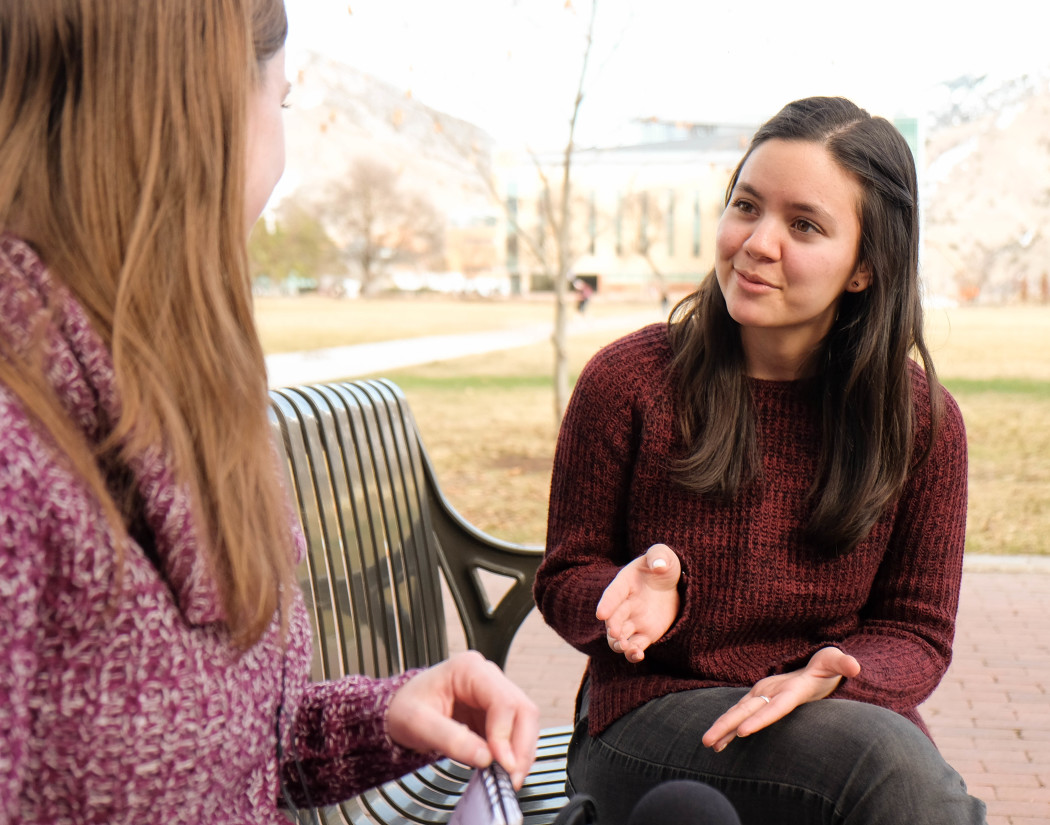Humans of USU: Student dives into water-shortage research
“I guess water is kind of my thing,” said Viviane Baji, a senior student researcher at Utah State University.
This summer, Baji collected research as an iFellow for the innovative Urban Transitions and Aridregion Hydro-sustainability (iUtah) program. iUtah is a five-year interdisciplinary research program studying Utah’s water’s future sustainability.
Baji presented her iFellow data analysis at the State Capitol in January and will be presenting again at the National Conference on Undergraduate Research in Asheville, North Carolina.
A Logan native, Baji is majoring in Environmental and Natural Resources Economics. She also serves as the Environment and Natural Resource club president this year.
The Statesman chatted with Baji about her research conclusions and her experiences as a student researcher.
US: Why did you chose to major in Environmental and Natural Resources Economics?
VB: It’s about applying economic principles and solutions to environmental problems and natural resource markets. I started out in biology, then I realized I was a lot more interested in the human dimension of biology and the environment. So I found this major requirement sheet for environmental and natural resources economics. I was looking it over and it was a really serendipitous moment. I thought, this is exactly what I want to do.
US: Tell us about your research as an iFellow.
VB: This summer I was the girl with an iPad at the grocery stores asking people to take a quick survey about their opinions about water. It was pretty cool. It was a state-wide effort to get a broad sample of everyone in Utah. Several universities got together and had teams at grocery stores everywhere. We ended up getting this data set of about 6,000 responses. That was really cool in the field experience with social sciences. After that, I got to do my own analysis of the data set.
US: What kind of analysis did you focus on?
VB: What I was interested in was the relationship between age and water shortage concern. It’s kind of an interesting question in itself. Do young people care about water shortage concerns? What I ended up finding is that in Utah, there is a positive age/water-shortage-concern relationship. So the older you get, the more likely you are to be concerned about water shortages. It’s definitely really interesting.
US: So what did you do with the research?
VB: I’ve actually developed an honors thesis based on that research, which is looking at the same relationship between water-shortage concern and age, but also other variables like geographic and gender and education levels. There’s a lot that needs to be done as far as gathering data to understand the water supply issue in Utah. I’ve also been working with Dr. Jackson-Smith on collecting information for each city in Utah on their projections for how water-short they’ll be in the future. It’s understanding if maybe concern levels are affected by where you’re from and if your particular city is projected to have a water concern or not.
US: Tell us about presenting on Capitol Hill.
VB: That was a really great experience. We went down there and we got to know other undergraduate researchers. My representatives came by, along with Rob Bishop and Senator Hilliard and the interns for the senators who couldn’t come by. They were really supportive of research, especially at the undergraduate level. They brought this policy perspective to the issue I had never studied before.
In research in general, you hope that you can gain a pretty wide audience. All researchers feel like they’re doing something important and it’s something that can make society a better place. I definitely hope to be a small but important part of the larger picture.
US: What other steps did you take to develop your research?
VB: A lot of it has to do with survey design and implementation. There’s a lot of methodology that goes behind how to phrase questions. The grocery store methodology is an interesting way of doing it, but if you go at all times during the day for several days and you try to get grocery stores with all kinds of socio-demographics who shop there, then you’re getting a pretty accurate representation of Utah as a whole, which is cool.
US: What are some of your future plans?
VB: I’d really like to stay involved in research and Western water issues. I’ve found it’s a really fascinating landscape and something I would like to pursue further. I know I want to go to graduate school, probably in economics. I didn’t realize presenting and being an advocate for research would be so much fun.
—ashley.ruth.stilson@aggiemail.usu.edu

